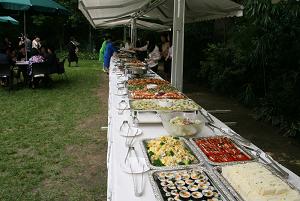
Hansik is preparing for its renaissance as the government launched large-scale projects to promote it to a world-popular cuisine. The Ministry of Food, Agriculture, Forestry and Fisheries announced that it will put its most effort in constructing infrastructures to globalize Korean food. Under the object, Korean hot pepper paste, gochujang and soybean paste, doenjang were registered in Codex Alimentarius Commission, which manages the international regulations regarding food, in July. On September 00, the Ministry propelled 800 professional Korean cuisine cooks. The nationwide promotion of Hansik, meaning Korean food, continues in Ewha: providing Korean food catering services to guests, conducting research on the ways to globalize Korean food andopening Korean Food Classes.
In Jinsunmi-guwan restaurant, every meal is made in home cooked style. Soy sauce and Korean soybean paste, doenjang are all made by the cooks in Jinsunmi-guwan restaurant. When it takes charge of catering service in school, they try to provide Korean cuisine to the guests. “Korean cuisine is very popular for both foreign and Korean visitors. Many guests who enjoyed our catering service liked Hansik very much. Menus like Bibim-bab and rice cake,” said Park Hyun-sook, the manager of Jinsunmi-guwan..
Asia Food and Nutrition Institute in Ewha conducted research on the ways to globalize Korean food as well. “There are certain factors of Hansik favored by all the people. We try to focus on that strength and develop Hansik as a universal food,” said Lee Min-hee, the researcher of the institution. The institution is developing some creative Korean food menus which strengthen the healthy aspects of Korean food and lighten the spicy taste which has been difficult for foreigners to try. In addition, the department of Nutritional Science and Food Management has been opening Korean Food Classes for. The classes teach from fundamental characters of Hansik to recipes of specific Korean food, such as gujeolpan (a Korean dish consisting of nine different foods assorted on a wooden plate with nine divided sections). “The class is very popular among the students majoring in Nutritional Science and Food Management. Since understanding Hansik is a good way to understand whole Korean culture, I think this class means more than just a cooking class,” said Professor Cho Mi-sook. (Department of Nutritional Science and Food Management)

